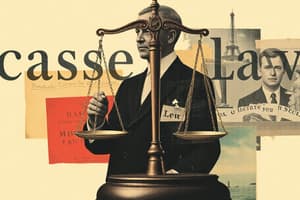Podcast
Questions and Answers
What is the primary purpose of legal reasoning?
What is the primary purpose of legal reasoning?
- To apply legal rules to specific factual situations. (correct)
- To create new laws and regulations.
- To confuse the parties involved in a legal dispute.
- To avoid making difficult decisions.
Which of the following is a key component of legal reasoning?
Which of the following is a key component of legal reasoning?
- Ignoring the facts of the situation.
- Making decisions based on personal feelings.
- Understanding and applying legal rules. (correct)
- Avoiding any form of reasoning.
What type of reasoning applies general legal principles to specific situations?
What type of reasoning applies general legal principles to specific situations?
- Deductive reasoning (correct)
- Reasoning by analogy
- Inductive reasoning
- Policy-based reasoning
Which type of reasoning involves drawing general principles from specific instances?
Which type of reasoning involves drawing general principles from specific instances?
What does reasoning by analogy involve?
What does reasoning by analogy involve?
Which type of reasoning considers the broader social implications of a decision?
Which type of reasoning considers the broader social implications of a decision?
What is the 'plain meaning rule' used for?
What is the 'plain meaning rule' used for?
What is the principle that courts should follow prior decisions called?
What is the principle that courts should follow prior decisions called?
What does 'distinguishing a case' involve?
What does 'distinguishing a case' involve?
Which fallacy involves attacking the person making an argument rather than the argument itself?
Which fallacy involves attacking the person making an argument rather than the argument itself?
Flashcards
Legal Reasoning
Legal Reasoning
A method of thought and argument used by lawyers and judges when applying legal rules to specific factual situations. It decides whether a rule applies to a set of facts and includes statutory interpretation, reasoning by analogy, and arguments about legal policy.
Deductive Reasoning
Deductive Reasoning
Applying general legal principles to specific facts, moving from general to specific, often using a syllogistic structure.
Inductive Reasoning
Inductive Reasoning
Drawing general principles from specific instances, often to formulate legal rules based on a pattern of court decisions; moves from specific to general.
Reasoning by Analogy
Reasoning by Analogy
Signup and view all the flashcards
Policy-Based Reasoning
Policy-Based Reasoning
Signup and view all the flashcards
Statutory Interpretation
Statutory Interpretation
Signup and view all the flashcards
Plain Meaning Rule
Plain Meaning Rule
Signup and view all the flashcards
Case Law
Case Law
Signup and view all the flashcards
Stare Decisis
Stare Decisis
Signup and view all the flashcards
Distinguishing Cases
Distinguishing Cases
Signup and view all the flashcards
Study Notes
The provided text is identical to the existing notes. There are no updates or new information to add.
Studying That Suits You
Use AI to generate personalized quizzes and flashcards to suit your learning preferences.




